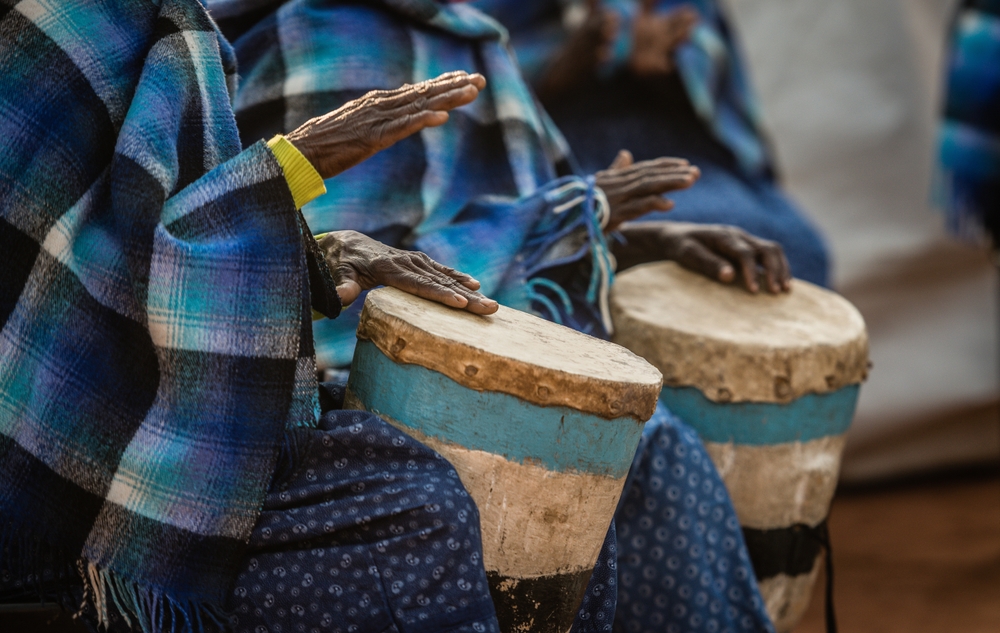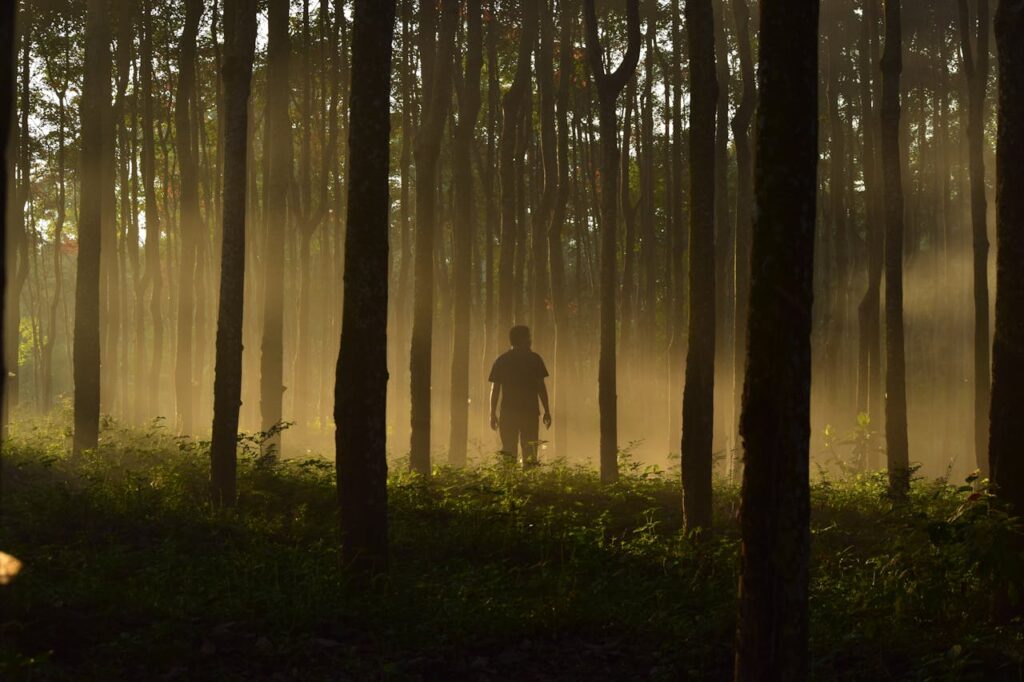Family of Missing Us Woman Speak Out After She’s ‘Found’ Alive Thousands of Miles Away Living a Totally Different Life

Some stories grip us not because they’re strange, but because they echo something inside us.
Take the headline about Kaura Taylor, a 21-year-old mother from Texas who vanished, only to reappear months later in a forest in Scotland. Not hiding. Not kidnapped. But reborn—under new names like “Asnat of Atehene” and “Lady Safi.” Surrounded by people who call themselves royalty of a “lost tribe.”
Her family aches for her return. Yet Kaura insists she isn’t missing at all. She’s making a choice. A choice to walk away from one life and step into another.
Beneath the drama that splashes across global headlines is a quieter question that belongs to all of us: What drives someone to leave everything behind in search of belonging, purpose, and meaning?
The Pull of a Different World
Disappearance rarely happens in a single moment. More often, it begins with a slow fading, like a light dimming long before the room goes dark.
For Kaura Taylor, the signs were there. Her family noticed her pulling away—dreams shifting, silence growing. Once set on becoming a lawyer, she left behind a scholarship in Atlanta to pursue cosmetology. Not unusual by itself, but in hindsight, it was one of many changes that made her loved ones uneasy.
By 2021, she was seeing a psychologist. Teachers noticed her demeanor shift. And then came the connection that would change everything: a classmate introduced her to the man who called himself King Atehene. What started as curiosity became belief, and belief became devotion. Soon, Kaura was on a six-month visa to Scotland. The last message her aunt received was a cryptic note: “We had to get out and explore a little bit.” After that, silence.
Her family’s shock deepened when they found her online—dressed in ceremonial robes, kneeling before King Atehene and Queen Nandi, even presenting them food. A video showed her calling herself the King’s second wife, declaring she was carrying a child for the Queen. For her mother, this was more than distance. This was devastation.
Authorities in Scotland acknowledged the situation, offering support but not stepping in. Kaura, however, made her position clear. On Facebook she wrote, “I fled a very abusive, toxic family. I’m very happy with my King and Queen.”
To her family, this was loss. To Kaura, this was freedom.

When Love Meets a Wall
For every person who walks away, there is a family left behind. And their grief is not only about absence—it’s about watching someone they love become unrecognizable.
Melba Whitehead, Kaura’s mother, has been outspoken in her pain. To her, the so-called Kingdom of Kubala is not a sanctuary, but a trap. She has called it a “cult” and questioned whether her daughter is truly making choices for herself. The wound deepened when Kaura left behind her own 8-month-old daughter. According to Whitehead, UK officials removed the baby from the encampment but denied her custody. For her, this was betrayal upon betrayal. “I need them to open their eyes and take a look at what Kaura is doing and who she’s with,” she pleaded.
Kaura’s aunt, Vandora Skinner, shares that heartbreak. She recalls Kaura’s teenage years as turbulent—“a very very unruly teen” who at times was “very disrespectful.” Yet Skinner still tried to create stability, even opening her home to Kaura’s boyfriends to earn trust. Still, the calls stopped. The texts went unanswered. By June, the family had no choice but to file a missing persons report.
Now, Kaura insists she was never missing, only choosing. But her family sees manipulation, not freedom. They describe being trapped in a cruel tension: wanting to honor her autonomy while fearing she no longer truly has it.

Her mother’s cry cuts through the noise of legal disputes and cultural clashes. “Evidently she is not capable of making decisions that are good for her and her child. So send her home. I am her mother. I will ensure she gets the help that she needs.” And Skinner adds, “She lived in a four-bedroom house, with her own room… I did get her to graduate high school.”
For them, this is not a headline. This is a daughter. A niece. A mother who belongs to them—and whom they fear they’ve already lost.
The Ache Beneath the Escape
When someone disappears into a new life, it’s easy to label it rebellion, or worse, betrayal. But beneath the surface, it’s often something far more human: a hunger to be seen, a longing to belong.
Kaura Taylor’s journey forces us to confront a question bigger than her story. Why would someone abandon the familiar for a world of new names, beliefs, and allegiances? Psychologists remind us that when people carry prolonged stress or unhealed trauma, they become more open to voices that promise certainty. Charismatic leaders, tightly knit groups, and simple narratives can feel like lifelines to someone drowning in confusion.
The path is rarely sudden. It begins quietly—an online connection, a gradual pull away from family, an invitation into a mission that feels larger than oneself. What begins as curiosity hardens into commitment when that mission offers unconditional acceptance.

For some, the desire to start over—to rewrite the script entirely—is strongest at life’s crossroads: after disappointment, in the shadows of trauma, or during seasons of deep disillusionment. To outsiders, Kaura’s choices may look extreme. To her, they may have felt like survival.
This is why mental wellness and emotional support cannot wait until crisis. Healing must start earlier—through therapy, through safe spaces where questions can be asked without judgment, through communities that nurture identity instead of demanding conformity. Because when people don’t find belonging in healthy spaces, they will go searching for it elsewhere.
The pandemic years only magnified this pattern. Isolation, pressure, and uncertainty left many young adults vulnerable. In that void, even the fantasy of a new identity—even the illusion of control—can feel like the only way out.
Reinvention or Surrender?
Change is part of being human. We shift careers, awaken spiritually, start over after heartbreak. Reinvention is often how we grow. But sometimes, what looks like transformation is really disappearance—an erasure of the self in the name of becoming someone new.
Kaura Taylor’s reintroduction as Asnat of Atehene raises that very tension. On the surface, it may look like empowerment: a young woman breaking free and reclaiming her story. Yet mental health experts warn us to look beyond appearances. When reinvention is fueled by old wounds and emotional turbulence, the “freedom” offered can be a form of control dressed up as liberation.
The real warning signs are rarely the rituals or robes. They’re subtler: the sudden adoption of a new identity, the severing of family ties, the abandonment of a child, the unquestioned trust placed in leaders who claim absolute authority. These choices force us to ask not about belief, but about agency. Who is holding the pen of this new story—the individual, or someone else?
True self-discovery doesn’t require you to erase your past; it allows you to integrate it. It nurtures growth while protecting your independence. Risk, however, arises when discovery slips into dependency, when curiosity hardens into loyalty without question, when freedom becomes obedience.
That line is thin, but it matters. Because the difference between rebirth and surrender is the difference between finding your voice and losing it.
The Silent Weight of an Untended Mind
We talk often about physical health—exercise, diet, sleep—but mental health still hides in the shadows, even though it quietly shapes every choice we make. Kaura Taylor’s journey is more than a family crisis or a headline about a so-called tribe. At its heart, it’s a reminder of how fragile the human mind can feel when left carrying unspoken pain.
Psychologists have long noted that trauma and chronic stress can reshape how people see the world. According to the National Alliance on Mental Illness (NAMI), young adults are particularly vulnerable, with 1 in 5 experiencing a mental health condition each year. When these struggles go unseen or untreated, the mind can cling to any lifeline that promises certainty—even if it comes from unlikely places.
Kaura’s transformation may have been her way of coping, of escaping an internal storm that felt too heavy to bear. To some, her new identity looks extreme. To her, it might have been relief. That’s the hidden truth about mental health: often, what looks irrational from the outside feels like survival from the inside.
This is why conversations about therapy, emotional support, and community care are not luxuries. They are lifelines. Just as a fractured bone needs a cast, a fractured spirit needs attention, compassion, and treatment. The earlier the support, the fewer the cracks that widen into crises.
If we want fewer stories of loved ones disappearing into unfamiliar worlds, we need more spaces where people feel safe to reveal their inner battles before they spiral into drastic decisions. Because sometimes, the most radical escape isn’t across an ocean—it’s the silent one happening inside the mind.
Reinvention Without Roots
Kaura Taylor’s story is unusual, even unsettling. But beneath the headlines, it mirrors something universal—the human longing to belong, to heal, to find a place where the soul finally exhales. Her reinvention, from a young mother in Texas to a follower in a woodland kingdom, shows us how fragile identity becomes when it isn’t anchored in safety, care, and connection.
Reinvention is not the enemy. Change can be the spark that saves us. But when transformation severs every tie, leaves children behind, and erases the self too quickly, we must ask the deeper questions: What are we running from? And what are we running toward?

If you, or someone you love, is searching for clarity or a fresh start, let that journey be rooted in healing, not in harm. Let it be surrounded by community, not isolation. The goal isn’t to resist change—it’s to make sure change is grounded, intentional, and sustainable.
Because reinvention without roots is not freedom—it’s another kind of loss. And the real power of transformation is not found in abandoning who we were, but in carrying that self forward into who we are becoming.
Loading...

